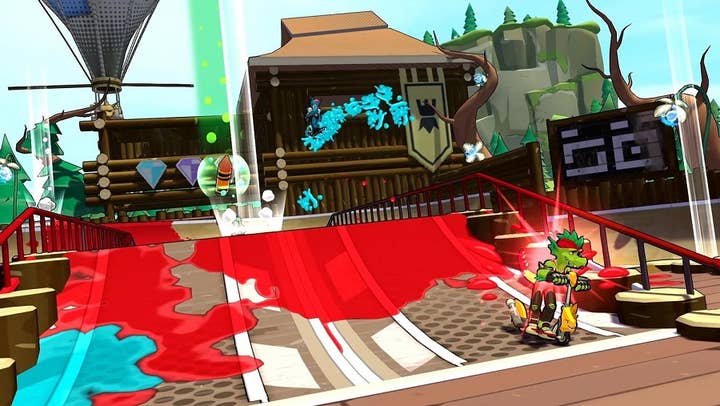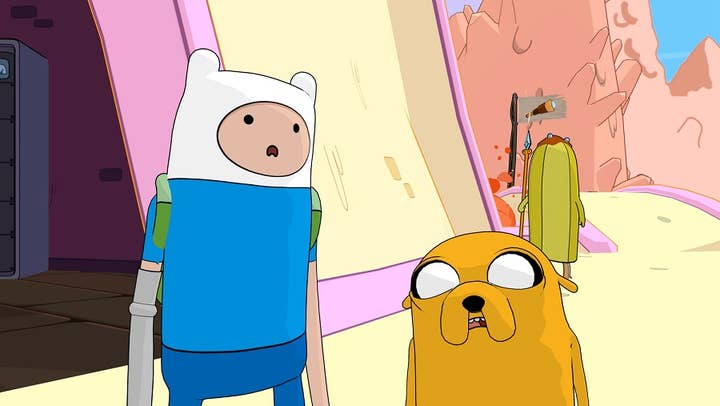"Games need to take more responsibility"
Outright Games chair Nick Button-Brown talks about making kids games when 11-year-olds are playing Grand Theft Auto, and how the industry needs to embrace its social responsibility
As chair of the BAFTA games committee and chair of the board of directors at Outright Games, Nick Button-Brown understands the difference between appreciating games as an artistic medium and appreciating them as a profitable business. Speaking with GamesIndustry.biz at E3, Button-Brown discussed both at length, starting with Outright's attempts to rejuvenate the market for children's games with titles like Adventure Time: Pirates of the Enchiridion and Crayola Scoot.
"There was a kind of height of kids' games, probably about 10 years ago," Button-Brown said. "THQ had made a very successful business around doing kids' licensed games, and they were competing against other publishers who wanted to do kids' licensed games. The budgets got higher and higher, and the licensing fees got higher and higher. It reached a stage where people struggled to make money. (Also they got distracted trying to do 1,000 other things.) But fundamentally, there is a business in kids' licensed games, and nobody's really attacked it since."
Outright Games was established 18 months ago to fill that void, focusing solely on family friendly licensed games on consoles, which Button-Brown identified as a particularly underserved market.

"There are some people doing it, but they're not doing it well. They're taking the licenses, cashing in on them, using them as user acquisition... So we feel there's a space to deliver kids' licensed games."
The strategy is to keep it simple, find good licenses and pair them with talented developers who actually care about the property in question. It's a pitch that Button-Brown feels is increasingly appealing to developers as the industry matures.
"The start of my career was all mature games. And then it reached a stage where I thought it would be quite nice if I could show my kids some of the things I was working on"
"We're all getting a bit older," he noted. "The start of my career was all mature games. And then it reached a stage where I thought it would be quite nice if I could show my kids some of the things I was working on. You see that with most developers. We've got a developer we're working with who is very enthusiastic about one particular IP because that happens to be the one their son loves. And I'm OK with that, because it means they actually care about it and want to do a great job."
But just as there's been a reversal in what developers want to work on, so too has there been a reversal in what children want to play.
"10 years ago, those licensed games would sell up to 18-year-olds," Button-Brown said. "I don't think we have that anymore. 11-year-olds unfortunately want to play Grand Theft Auto. Kids grow old quickly. But there's still a market. We're not going to sell 10 million units, but we can sell a good number of units that justifies making it."
As a result, Button-Brown sees Outright's target demographic as the 4-11 age group. Certain properties like Adventure Time will attract users outside of that age range, and Button-Brown believes there's plenty in such games to appeal to those older players as well, but the market for family friendly licensed games is not what it once was, as Outright's players are essentially graduating to Grand Theft Auto.

The idea of children playing excessively violent or vulgar games has long been a concern surrounding the games industry, which is one of the reasons ratings systems were introduced in the first place. And while Button-Brown said that parents share responsibility for keeping such games out of kids' hands, it is one of a number of areas where the industry itself could do more.
"I think games need to take more responsibility. We have the opportunity to do good, and it can be in subtle ways"
"I think games need to take more responsibility," Button-Brown said. "We have the opportunity to do good, and it can be in subtle ways. Hopefully we can learn some lessons from what we did 20 years ago, or 10 years ago--things that took our industry in certain directions. Can we deal with things with more social responsibility?"
One such area is in content curation. When asked about Valve's proclamation that it would allow anything on Steam that wasn't illegal or trolling, Button-Brown took exception.
"I think that's copping out," he said. "It is our responsibility. It's not just up to the parents. That's too easy a get-out. It's our responsibility to provide experience which cater to a mature market, and to make sure the experiences catering to a mature market are selling to [the appropriate audience] that wants that experience."
Loot boxes are another area of contention where the industry has taken a lot of flack, with a number of countries exploring legislative solutions to their concerns about the monetization practice. Although Outright isn't resorting to loot boxes, Button-Brown said there are situations where loot boxes can be handled responsibly. However, he added that it's hard to defend those against legislation in light of the more aggressive tactics some have employed.
"Shouldn't we be in the situation where we don't have to wait for it to go wrong before we respond to it. It's not regulation, it's social responsibility. We know when we're doing bad things."
At this point another attendee in the Outright E3 booth interjected that some people view anything that isn't explicitly against the law as fair game, an attitude Button-Brown did not hold in high regard.
"I'd like to think we're a bit more grown up than that, or maybe the people that are a bit more grown up need to speak out a bit."
